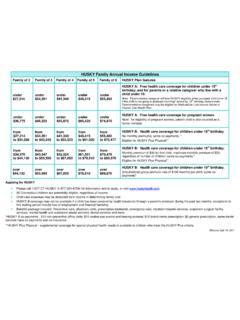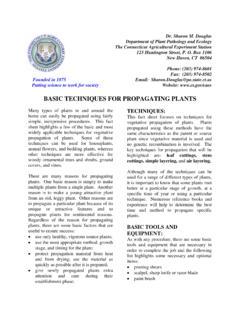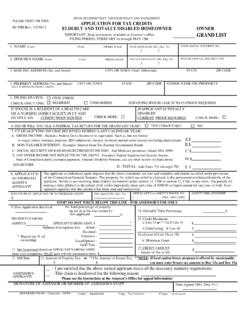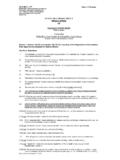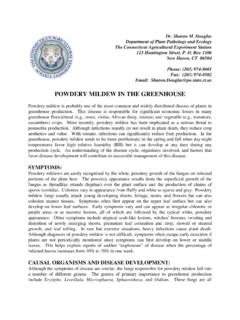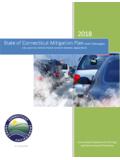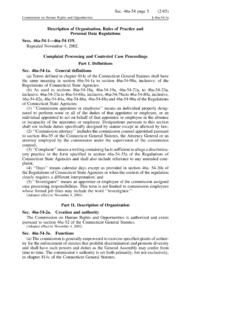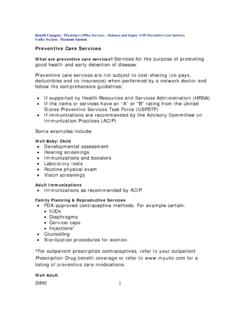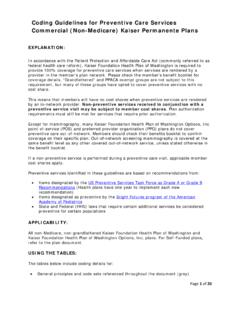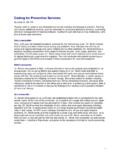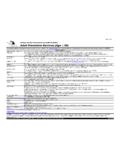Transcription of STATE OF CONNECTICUT Department of …
1 STATE OF CONNECTICUT Department of Developmental services Minimum preventive care Guidelines For Persons With Intellectual/Developmental Disabilities DDS Health Standard 08-1 Routine preventive Health care 2008, Attachment A ; revised 11/2013 1 Procedure 19-39 Years 40-49 Years 50-64 Years 65 and Over preventive Health Visit Physical Exam (including Height, Weight; Blood pressure, Skin, and Breast Exams (testicular exam as clinically indicated) Annually and as clinically indicated Annually and as clinically indicated Annually and as clinically indicated Annually and as clinically indicated Lab Work Cholesterol screening The USPSTF recommends screening for Men 35 and older, men 20-35 if at increased risk for coronary heart disease; Women 45 and older, women 20-45 if at increased risk for coronary heart disease.)
2 Diabetes Screening Once every three years or as clinically indicated. Refer USPSTF website. Liver Function For monitoring medication use and as clinically indicated. Thyroid Function Every 3 years for persons with Down Syndrome; clinical discretion for others Screenings Hearing and Vision Baseline, then as determined by provider; re-evaluate if changes noted. Glaucoma screening* Persons at high risk Persons at high risk Persons at high risk* Abdominal aortic aneurysm: men One-time screening for abdominal aortic aneurysm (AAA) by ultrasonography in men aged 65 or older who have ever smoked. Osteoporosis screening (Bone density testing)** High risk persons (mobility impairments, certain anticonvulsant medications).- repeat every two years after an abnormal screening Post-menopausal women or high risk persons.
3 Osteoporosis screening: women Screen persons with risk factors including impaired mobility, low body weight, use of medications contributing to bone loss, history of fractures, limited diet, and Down Syndrome. Dysphagia and Swallowing Risk screening On-going observation for signs of difficulty swallowing especially in high risk populations; further evaluation, including Modified Barium Swallow as appropriate to symptoms and health history and risk factors. Cancer Screenings Breast cancer screening Mammography for women and clinical breast examination, every 1-2 years for women aged 40 and older Cervical Cancer screening Screening for cervical cancer in women ages 21 to 65 years with cytology (Pap smear) every 3 years (or for women ages 30 to 65 years who want to lengthen the screening interval, screening with a combination of cytology and human papillomavirus (HPV) testing every 5 years).
4 Recommends no screening for cervical cancer in women younger than age 21 years; and against routinely screening women older than age 65 for cervical cancer if they have had adequate recent screening with normal Pap smears and are not otherwise at high risk for cervical cancer. Colorectal cancer screening The USPSTF recommends screening for colorectal cancer using fecal occult blood testing, sigmoidoscopy, or colonoscopy in adults, beginning at age 50 years and continuing until age 75 years. Repeat at 10 year intervals for people with average risk Prostate Specific Antigen (PSA) Routine testing for men 40-49 years of age is not recommended except for men at high risk (family history), and as clinically indicated. Testing for men in other age ranges as clinically indicated. (as clinically indicated) Cardiac Screening Electrocardiogram (EKG/ECG) For medication monitoring or per clinical indications.
5 Echocardiogram Obtain baseline for persons with Down Syndrome if no record of cardiac function available. Mental Health Dementia Screening Ongoing observations for signs that indicate changes in ability to perform daily living activities; especially in persons with Down Syndrome after the age of 40. Depression Screening Ongoing observations for changes in sleep patterns, appetite, weight, and activity level, or other clinical signs of depression. Procedure 19-39 Years 40-49 Years 50-64 Years 65 and Over Infectious Disease Screening Tuberculosis screening (PPD) Every 2 year Every 2 years Every 2 years Every 2 years STATE OF CONNECTICUT Department of Developmental services Minimum preventive care Guidelines For Persons With Intellectual/Developmental Disabilities DDS Health Standard 08-1 Routine preventive Health care 2008, Attachment A.
6 Revised 11/2013 2 Hepatitis B and C Clinical discretion, if risk factors present one-time screening for HCV infection to adults born between 1945 and 1965 Human Immunodeficiency Virus The USPSTF recommends that clinicians screen for HIV infection in adolescents and adults ages 15 to 65 years and pregnant women. Younger adolescents and older adults who are at increased risk should also be screened. Clinical discretion advised Chlamydia and Sexually Transmitted Diseases (STDs) Screen all sexually active less than 25 years. Over 25 years, screen only those with risk factors such as multiple partners, or inconsistent use of barrier contraceptives or if unable to obtain sexual history due to intellectual disability and definite sexual history.
7 All new admissions to DDS public and private without history of prior screening will be tested for STD s. Chlamydia infection screening Screening for Chlamydia infection for all sexually active women aged 24 and younger and for older women who are at increased risk every 3 years. Gonorrhea screening: women The USPSTF recommends that clinicians screen all sexually active women, including those who are pregnant, for gonorrhea infection if they are at increased risk for infection (that is, if they are young or have other individual or population risk factors). Syphilis screening The USPSTF strongly recommends that clinicians screen persons at increased risk for syphilis infection, and screen all pregnant women for syphilis infection. Immunizations Polio, MMR, Tdap, Varicella As recommended by the CDC throughout the adult lifespan Influenza Vaccine Annually Annually Annually Annually Pneumococcal Vaccine Once before age 65 if at risk Once over age 65 Hepatitis B vaccine Recommended series once; (Check antibody status as necessary) recommended taking out Check antibody status as necessary Hepatitis A vaccine High risk or anyone with known liver disease including Hep B carriers Herpes Zoster Vaccine (Zostavax)** Not indicated Once over age 60 for those who lack evidence of immunity (documentation of vaccination or evidence of infection) ** Human Papilloma Virus (HPV) Series recommended to all potentially sexually active women age 9 to 26.
8 Not indicated Varicella Vaccine Unless there is a history of varicella vaccination or history of chicken pox adult should obtain a varicella titer. If no immunity receive vaccination if not immune should get the vaccine. X-Ray Cervical spine Persons with Down Syndrome to rule out Atlanto-Axial Instability Counseling Lifestyle counseling Annually ( Includes information on health and wellness, accident prevention, sexuality information, safety considerations) Alcohol misuse counseling The USPSTF recommends screening and behavioral counseling interventions to reduce alcohol misuse by adults, including pregnant women, in primary care settings Healthy diet counseling The USPSTF recommends intensive behavioral dietary counseling for adult patients with hyperlipidemia and other known risk factors for cardiovascular and diet-related chronic disease.
9 Intensive counseling can be delivered by primary care clinicians or by referral to other specialists, such as nutritionists or dietitians. STIs counseling The USPSTF recommends high-intensity behavioral counseling to prevent sexually transmitted infections (STIs) for all sexually active adolescents and for adults at increased risk for STIs. Tobacco use counseling and interventions The USPSTF recommends that clinicians ask all adults about tobacco use and provide tobacco cessation interventions for those who use tobacco products. Pregnant women who smoke should be provide augmented, pregnancy-tailored counseling. Source unless otherwise indicated: preventive services Task Force (USPSTF) * American Academy of Ophthalmology **National Osteoporosis foundation **Center for Disease Control STATE OF CONNECTICUT Department of Developmental services Minimum preventive care Guidelines For Persons With Intellectual/Developmental Disabilities DDS Health Standard 08-1 Routine preventive Health care 2008, Attachment A.
10 Revised 11/2013 3 DENTAL RECOMMENDATIONS PROCEDURE 0-1 YEARS OLD 1-18 YEARS OLD 18+ with teeth 18+ no teeth Oral Exam Clinical Discretion Annually Annually Annually Screening: x-rays NA Clinical Discretion/ 6-24 month intervals Clinical Discretion/ 6-36 months (?? intervals ) Clinical Discretion/ Not applicable Dental Prophylaxis Clinical Discretion Annually 2 times per year if clinically indicated. Annually 2 times per year if clinically indicated NA Professional Denture / Partial exam NA Annual if partials present Annual if partials present Annual if partials/ dentures present Tooth brushing 2 times a day 2 times a day 2 times a day 2 times a day
